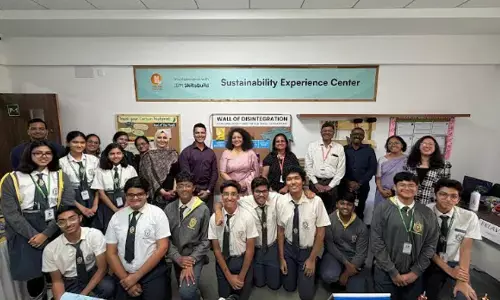Inclusive learning and critical thinking

With each passing year, Indian schools are witnessing an increase in students from all sectors. Traditionally, students have been victims of discrimination based on race, caste, gender, disability, the language they speak, their societal status, and many more.
Inclusive education: An approach to providing equal opportunity
The goal of inclusion in any field is to uphold the intrinsic worth of every person. In addition, it promotes everyone’s active engagement in society, notwithstanding their individual physical or mental attributes. Similarly, inclusive education focuses on finding the most effective strategies to meet each student’s unique set of learning demands.
Its foundation is the straightforward notion that all children and youth have an inherent right to be included in a general education classroom and to be afforded equal chances and experiences. Thus, there is no denying the fact that inclusive education is not just a concept; it is a powerful approach that aims to provide equal opportunities for all students, regardless of their ability, nationality, and background.
Today, this method goes beyond the classroom and includes critical thinking as a valuable ability for all students, but particularly for those who wish to comprehend and value inclusion and diversity in teaching and learning. In educational contexts, diversity and inclusion refer to acknowledging and respecting other identities, viewpoints, and experiences. When it comes to diversity and inclusion concerns, critical thinking assists students in refuting presumptions, looking closely at evidence, analyzing arguments, and communicating clearly.
Role of teachers and guardians: student success
Create a safe classroom environment
Children in a classroom are like colorful threads, and instructors are the weavers who weave them into a beautiful jacket that shields them from all kinds of difficulties. In this sense, setting up a secure and friendly learning environment in the classroom is the first step toward inclusive learning. It is the duty of educators to create an environment in which each child feels safe and appreciated. For every student to succeed, educators must address issues of bullying, prejudice, and cultural awareness.
Know every student’s unique need
In India, inclusive education acknowledges the individuality of each student despite the wide range of origins from which they originate. Therefore, in order to foster inclusivity, educators need to make an effort to comprehend the unique strengths, weaknesses, and learning preferences of every student. This is particularly relevant in a nation such as India, with its diverse languages, cultures, and skills. In reality, by helping teachers gain important information about their children, parents also play a significant role so that they can modify their methods to suit everyone’s unique demands.
Encourage open-mindedness
Students of today may comprehend that bullying might happen when someone speaks in an aggressive or harsh manner. Still, children may have trouble distinguishing exclusion from bullying. Here’s where educators and parents can support students and kids by fostering empathy and an open mind. Parents should inquire about their children’s mood, behavior, and general well-being on a daily basis. This point of view will encourage inclusive classroom practices and assist children in developing more profound empathy.
Support academic and social-emotional development
Teachers are crucial to fostering the intellectual and social-emotional development of their students. They cater to the academic needs of learners with varying ability levels and provide the appropriate kind of support. In light of this, parents and guardians also foster their children’s social and emotional growth by promoting emotional intelligence and effective communication at home.
Cultivate critical thinking
In today’s modern era, cultivating critical thinking abilities is a crucial part of creating inclusive learning settings. In order to help pupils develop critical thinking skills, teachers and guardians must actively encourage them to challenge presumptions, examine the facts, and form original ideas. Teachers and parents can support kids in developing the skills they need to handle complicated topics and participate in inclusive debates by fostering an environment in the classroom or at home that honors varied viewpoints and promotes open communication. Furthermore, facilitating group problem-solving and decision-making can strengthen critical thinking abilities and advance inclusivity.
Importance of critical thinking in encouraging inclusivity
Encourage students to ask questions
According to NCBI, younger kids (10–12 years old) and teenagers (12–14 years old) showed improved memory for answers to trivia questions they were interested in as opposed to answers to questions they weren’t. Thus, by encouraging students to ask questions, educators can create opportunities for critical thinking and open dialogue, allowing students to challenge their own assumptions and biases. Additionally, this approach promotes inclusivity by ensuring that all voices are heard and considered in the learning process.
Enhance creativity and curiosity
It is not an overstatement to say that critical thinking allows individuals to think outside the box and explore different perspectives, fostering creativity and curiosity. It encourages learners to question assumptions and seek alternative solutions, promoting a more inclusive learning environment. Additionally, critical thinking helps students develop empathy and understanding toward diverse viewpoints, leading to a more inclusive and equitable classroom.
Boost career prospects
Critical thinking skills are highly valued in the professional world, as they enable individuals to analyze complex problems, make informed decisions, and adapt to changing circumstances.
By fostering critical thinking in education from an early age, students can become better at navigating diverse workplaces and contributing to inclusive environments. Additionally, employers often seek candidates who can think critically and consider multiple perspectives, making it a valuable skill for career advancement.
(The author is MD, Birla Open Minds)











